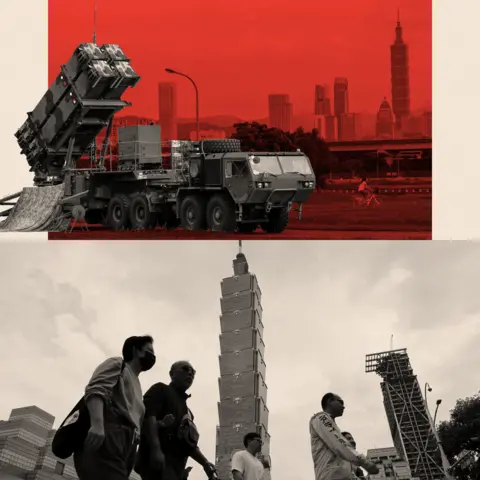How Taiwan is preparing for Chinese attack with acting, fake blood and mock missile strikes
It was just another Friday morning on the Taiwanese island of Kinmen, a few kilometres from the coast of China, when an air raid siren pierced the calm. At a local government office, people switched off their lights and dove under tables. Others fled to an underground car park. At a nearby hospital, staff rushed to treat people staggering in with bloody injuries. But the blood was fake, and the casualties were volunteer actors. Together with the government workers, they were taking part in mandatory civil defence and military drills held across Taiwan last month. The purpose? Rehearsing their response to a possible attack by China.
China has long vowed to reunify with self-governing Taiwan and has not ruled out the use of force. It is a threat that Taiwan is increasingly taking seriously. President William Lai, who took office last year, is behind one of the strongest pushes in years to strengthen defence. One of his biggest challenges, however, is convincing his own people of the urgency. While his defence drive has garnered support, it has also sparked controversy.
According to a survey from the Institute for National Defense and Strategic Research (INDSR), 65% of Taiwan's populace believe it is unlikely that China will attack in the next five years. This sentiment persists despite warnings from the US about an imminent threat and preparations indicating that China could be ready to invade by 2027.
To counteract this skepticism, Lai's administration emphasizes military readiness, stating that “by preparing for war, we are avoiding war.” Recent reforms include increasing defence spending and enhancing military training. Urban defence exercises, such as the Urban Resilience Exercise, have also intensified, involving every major urban area across Taiwan in air raid drills.
Participants in these drills are implementing more realistic simulations, addressing previous concerns about troop morale and preparedness. Local community involvement has also increased as civilian defense drills become more integral to Taiwan's defense strategy.
However, opinions vary widely among Taiwanese civilians; while some, like Stanley Wei and Ray Yang, view these drills as necessary due to perceived threats from China, others express doubt about the likelihood of invasion, citing the ongoing advancements in cross-strait relations.
As this complex situation unfolds, Taiwan's government continues to reinforce its defensive posture while navigating the intricate dynamics of public opinion and regional relations with China.






















